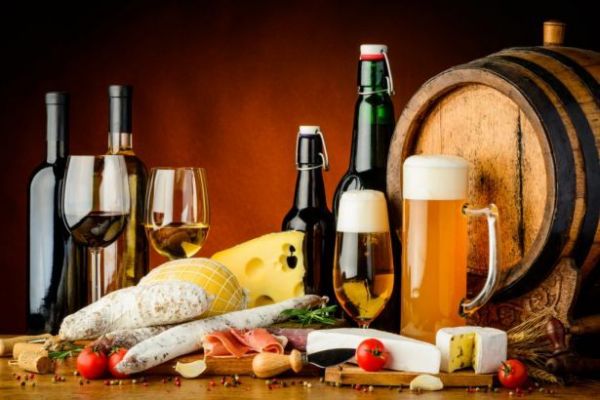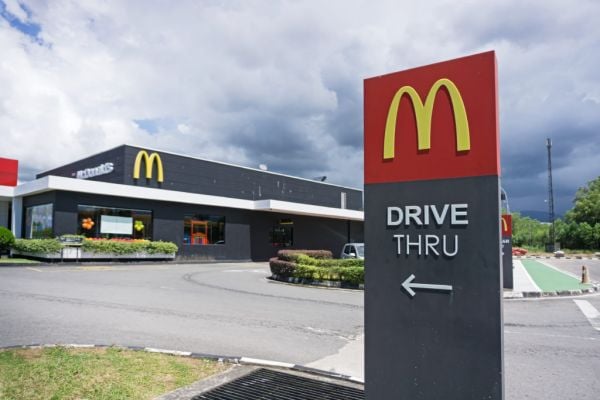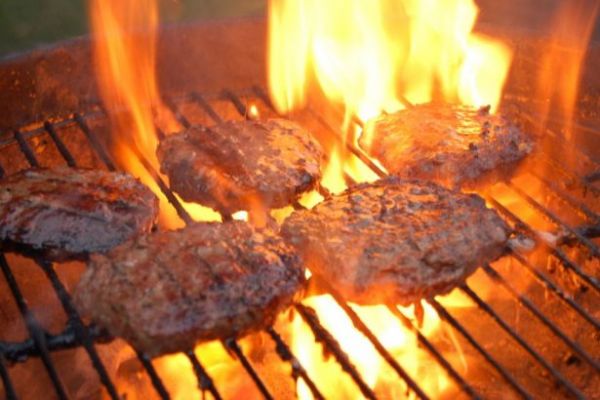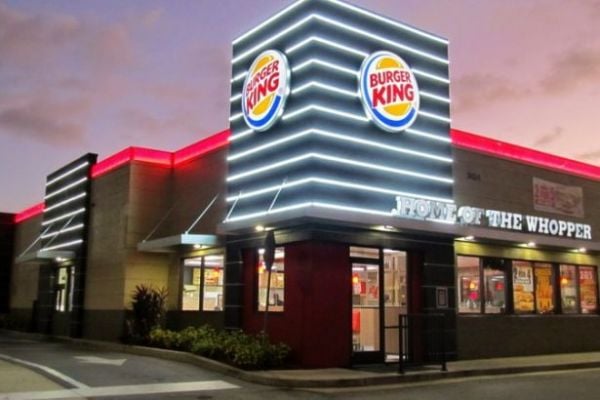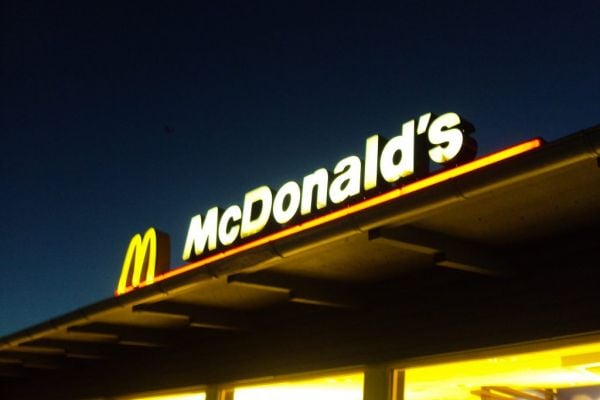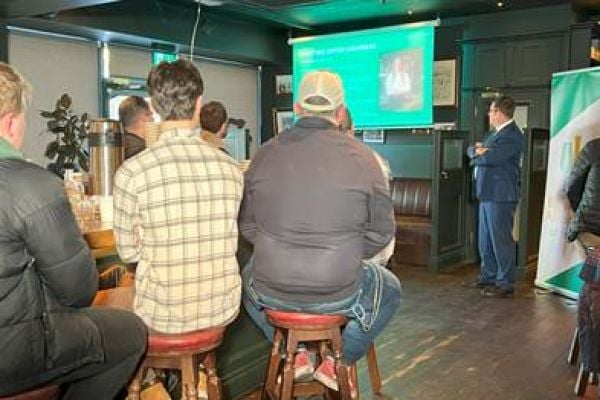Hospitality Ireland presents a round-up of the latest pub, restaurant, food and drinks news.
Worker Shortage Dampens Spirits As Britain's Pubs Enjoy Reopening
British pub operators reported a rebound in sales on Thursday September 23, as drinkers returned after months of lockdowns, but flagged a labour crunch that could strain the industry ahead of a busy holiday season.
The hospitality sector has suffered from prolonged closures of pubs and hotels over the last 18 months and still faces the risk of renewed restrictions should any spike in infections becomes unmanageable.
Since England lifted all restrictions in July, many people have returned to eateries and pubs to dine out with their friends and families, although some remain wary.
A bigger challenge could be a shortage of labourers, which has beset the industry since the reopening and could potentially limit earnings during usually bustling Christmas season around the end of the year.
Europeans who left during because of the pandemic, or because of Britain's departure from the European Union, and a "pingdemic" that forced people to isolate after being "pinged" by a government app because they had been in contact with someone who had tested positive for COVID-19 have contributed to the staff shortfall.
"Whilst this is very frustrating, we believe that the end of the furlough scheme in September will increase the pool of labour," said City Pub Group, which runs 45 pubs.
Phil Urban, who heads Britain's second-largest pub operator Mitchells & Butlers, has said that uncertainty around the pandemic caused some workers to give up on the sector.
Mitchells, a more than century old brewer that runs 1,700 pubs and restaurants, said sales over the last eight weeks were above pre-pandemic levels at 104%.
Year-to-date sales at the owner of Harvester, Toby Carvery and All Bar One were at 45% of 2019 levels.
Fuller, Smith & Turner, which has a larger exposure to London, said like-for-like sales stood at 86% of 2019 levels in the seven weeks to September 18.
The company, popularly known as Fuller's, said that it expects footfall in the city to increase as people continue to return to offices. Eateries in cities have taken longer to recover as companies adapt more to a flexible model, which means more time working from home.
Its boss Simon Emeny said the company was not immune to the wider challenges including recruitment, but said its rural pubs and hotels have benefited from more domestic tourism.
"We are now beginning to see a return of customers to our central London pubs, which is a great sign as we head into a busy trading period," he said.
McDonald's Restarts Share Buybacks As Business Recovers From Pandemic Hit
McDonald's Corp said on Thursday September 23 that it would restart share buybacks and also increased its quarterly dividend by 7%, as the world's largest fast food chain recovers from the impact of the COVID-19 pandemic.
McDonald's had suspended its $15 billion buyback program early last year as the burger chain looked to conserve cash in order to navigate through the COVID-19 health crisis that had forced many of its restaurants to close their doors to diners.
But global sales are now above pre-pandemic levels, with the company raising its guidance for fiscal 2021 in July on the hope people will continue to head out to restaurants as economies reopen.
The burger chain declared a quarterly cash dividend of $1.38 per share payable on December 15, taking its fourth-quarter dividend payout to over $1 billion.
Doordash Backs Round Valuing Delivery Start-Up Flink At $2.5bn - Sources
US food delivery company Doordash is backing a new funding round at quick-delivery company Flink that values the Berlin-based startup at $2.5 billion, sources familiar with the matter said on Friday September 26.
The $600 million capital call follows a $240 million fund raising in June at Flink. The company, founded at the turn of the year, specialises in delivering groceries within minutes of a customer placing an order on a smartphone app.
Flink competes with other upstart companies like Gorillas and Getir in an increasingly crowded marketplace for so-called "quick commerce", where growth is explosive but profits have so far yet to materialise.
At the same time, more established food delivery players, like Doordash or Germany's Delivery Hero, are becoming more acquisitive amid signs the industry could enter a period of consolidation.
Flink's Series A funding round in June was led by Dutch-based consumer internet investor Prosus, San Francisco technology investor BOND, and Mubadala Capital, which is part of Abu Dhabi's sovereign wealth fund.
The sources familiar with Flink's latest funding round said that these existing investors had also chipped in.
Flink declined to comment while Doordash was not immediately available for comment outside U.S. office hours. Bloomberg first reported that Doordash was backing Flink although its report put a lower company valuation of $2.1 billion on the round.
India Antitrust Body Fines United Breweries And Carlsberg In Price Fixing Case
India's antitrust watchdog on Friday September 24 imposed a penalty of $102 million on Heineken-controlled beer giant United Breweries and $16 million on the local unit of Denmark's Carlsberg in a case related to cartelisation of beer prices in the country.
The order comes after a long-drawn investigation that in 2018 saw Competition Commission of India (CCI) raiding the offices of the brewers. The raids happened after rival Anheuser Busch InBev told the watchdog it had detected an industry cartel in India after it acquired operations of SABMiller Plc.
A detailed CCI investigation, reported by Reuters last year, found that the companies collectively strategised in seeking price increases in several states, forging a cartel.
In a final order published Friday, the CCI announced penalties of 7.5 billion rupees on United Breweries and 1.2 billion rupees on Carlsberg, after the amounts were lowered as the companies cooperated with the investigators.
AB InBev was given a 100% exemption from penalties in the case as it alerted the CCI about the cartel, the order added.
The order passed by CCI imposed a penalty of $23,684 on Carlsberg India Managing Director Nilesh Patel and $6,497 on United Breweries chief of sales Kiran Kumar, among others.
Heineken said United Breweries has recently become part of Heineken, which itself was not part of the CCI investigation. "We are currently reviewing the (CCI) decision and will consider our next steps, including the possibility of lodging an appeal," Heineken said.
United Breweries said that it was reviewing the CCI order. Kumar did not respond to an email seeking comment.
A Carlsberg spokesperson also said the company was reviewing the order and there was no comment on behalf of Patel, while a spokesperson for AB InBev India said the company was "pleased with the outcome of this order."
The CCI "directs the parties to cease and desist in future from indulging" in such activities, said the watchdog's 231-page order, which also imposed penalties on several company executives it said were involved in price fixing at the time.
The order casts a shadow on the three brewers, which account for roughly 88% of India's $7 billion beer market. Typically, companies file legal challenges against such CCI's decision.
India's alcohol market has complex rules. States regulate taxes and prices, which are every year approved by local authorities. Collectively deciding on price increases gave them companies more bargaining power with authorities.
"It seems that only to have a strengthened bargaining power against the state," the companies "came hand-in-gloves with each other and shared their commercially sensitive information," the CCI order said.
The investigation conducted by CCI's investigation arm had said "the collusion ... has been mostly through the highest level of management in these companies," including managing directors, vice presidents, and sales and marketing heads, Reuters reported last year.
Long Queues And Fuel Rationing As Britain Faces Truck Driver Shortage
Lengthy queues of vehicles snaked their way to gas stations in Britain on Saturday September 25 where an acute shortage of truck drivers has led to fuel rationing and some pumps running dry, and prompted the government to consider issuing temporary work visas.
Across the country, motorists waited in long lines to fill up their vehicles. One big distributor said it was rationing sales and a number of operators said they were having to close some forecourts, provoking panic-buying.
Government ministers and oil companies say there are ample stocks of petrol or diesel and there is no cause for alarm, but the lack of truck drivers is hampering transport of fuel from refineries to gas stations.
With retailers also warning of significant disruption to their supplies in the run-up to Christmas, Prime Minister Boris Johnson's office has said it is looking at a short-term fix to address the shortage of heavy goods vehicle (HGV) drivers.
"We're looking at temporary measures to avoid any immediate problems, but any measures we introduce will be very strictly time limited," a spokeswoman for Johnson's Downing Street office said in a statement.
"Like countries around the world we are suffering from a temporary COVID-related shortage of drivers needed to move supplies around the country."
The UK's Road Haulage Association (RHA) says Britain is facing a shortage of some 100,000 drivers, a result of workers leaving the industry, Brexit and COVID-19, which put a stop to driver training and testing for about a year.
Newspapers have reported that the government would allow up to 5,000 foreign drivers into Britain on short-term visas, a measure that logistics companies and retailers have demanded for months but which the government had previously ruled out.
Business leaders and the haulage industry have welcomed the reported plan, but there are also doubts about whether it will go far enough, or if drivers will come to Britain from Europe where countries are also facing labour shortages.
"We'll have to see if we can attract people for a short period of time," Huw Merriman, chairman of parliament's transport committee, told BBC TV.
Brian Madderson, the chairman of the Petrol Retailers Association which represents independent fuel retailers, said he expected the problem to continue for a "while longer".
"I think this situation is going to get worse before it gets better," he told Sky News.
The issue came to the fore after BP said it had to close some of its outlets due to the driver shortages, with Shell and ExxonMobil's Esso also reporting problems with supplies to gas stations.
EG Group, which runs 341 forecourts across Britain, said on Friday it would impose a purchase limit of £30 per customer for fuel due to the "unprecedented customer demand".
From early on Saturday September 25, motorists began queuing outside filling stations and some forecourts closed as fuel ran out.
"I was out on my bike ... and came past my BP garage and it was chaos," Merriman said. "As soon as the message gets out there might be a fuel shortage, people understandably react."
Police across the country reported congestion caused by motorists waiting in line, and urged people not to contact them about the problems the traffic was causing.
Britain, the world's fifth-largest economy, is also grappling with a spike in European natural gas costs causing soaring energy prices and a potential food supply crunch.
Britain says the long-term solution for the haulage industry is for more British drivers to be hired and for them to be paid better.
BP Says Nearly A Third Of Its UK Fuel Stations Are Running On Empty
BP said that nearly a third of its British petrol stations had run out of the two main grades of fuel on Sunday September 26 as panic buying forced the government to suspend competition laws and allow firms to work together to ease shortages.
Lines of vehicles formed at petrol stations for a third day running as motorists waited, some for hours, to fill up with fuel after oil firms reported a lack of drivers was causing transport problems from refineries to forecourts.
Some operators have had to ration supplies and others to close gas stations.
"With the intense demand seen over the past two days, we estimate that around 30% of sites in this network do not currently have either of the main grades of fuel," BP, which operates 1,200 sites in Britain, said in statement.
"We are working to resupply as rapidly as possible."
The fuel panic comes as Britain faces several crises: an international gas price surge that is forcing energy firms out of business, a related shortage of carbon dioxide that threatens to derail meat production, and a shortage of truck drivers that is playing havoc with retailers and leaving some shelves bare.
Anglo-Dutch oil group Shell said that it had also seen increased demand for fuel.
In response business minister Kwasi Kwarteng said he was suspending competition laws to allow firms to share information and coordinate their response.
"This step will allow government to work constructively with fuel producers, suppliers, hauliers and retailers to ensure that disruption is minimised as far as possible," the business department said in a statement.
Transport minister Grant Shapps had earlier appealed for calm, saying the shortages were purely caused by panic buying, and that the situation would eventually resolve itself because fuel could not be stockpiled.
"There's plenty of fuel, there's no shortage of the fuel within the country," Shapps told Sky News.
"So the most important thing is actually that people carry on as they normally would and fill up their cars when they normally would, then you won't have queues and you won't have shortages at the pump either."
After meeting Kwarteng, industry figures including representatives from Shell and Exxon Mobil Corp said in a joint statement issued by the business department that they had been reassured, and stressed there was no national fuel shortage.
Earlier, Shapps said the shortage of truck drivers was down to COVID-19 disrupting the qualification process, preventing new labour from entering the market.
Others pinned the blame on Brexit and poor working conditions forcing out foreign drivers.
The government on Sunday announced a plan to issue temporary visas for 5,000 foreign truck drivers.
But business leaders have warned the government's plan is a short-term fix and will not solve an acute labour shortage that risks major disruption beyond fuel deliveries, including for retailers in the run-up to Christmas.
Shapps called the panic over fuel a "manufactured situation" and blamed it on a hauliers' association.
"They're desperate to have more European drivers undercutting British salaries," he said.
An Opinium poll published in the Observer newspaper on Sunday said that 67% of voters believe the government has handled the crisis badly. A majority of 68% said that Brexit was partly to blame.
Opposition Labour Party leader Keir Starmer, speaking at his party's annual conference in southern England, said ministers had failed to plan for labour shortages following the 2016 Brexit vote and called for a bigger temporary visa scheme.
UK Accountancy Firm Grant Thornton Fined Over Patisserie Valerie Chain Audit
Accountancy firm Grant Thornton has been fined for its audit of Patisserie Valerie, the British café chain that collapsed in 2018, throwing 900 people out of a job and triggering a separate fraud investigation into accounting irregularities.
The Financial Reporting Council (FRC) said that it was fining Grant Thornton £4 million but would cut it to £2.34 million due to mitigating factors, as well as imposing non-financial measures to improve its procedures.
The FRC said Grant Thornton's audits during 2015, 2016 and 2017 missed "red flags" and failed to stand back and challenge the management of the cafe chain, whose collapse FRC said led to the closure of 70 stores and more than 900 job losses.
David Newstead, Grant Thornton's audit partner for Patisserie Valerie, was to be fined 150,000 pounds, falling to £87,750, due to mitigating factors.
The fines are low compared with record or near record double-digit sums that bigger accounting rivals have paid out in recent years following other corporate collapses as the watchdog sought to fend off criticisms of being too soft.
The FRC said it took Grant Thornton's "size, financial resources and financial strength" into account in determining the level of sanctions. The accountants provided an "exceptional level of co-operation" with the investigation, it said.
Grant Thornton had a net income of 471 million pounds in 2020, with an underlying trading profit of 72 million pounds, up 14% on the prior year.
"We regret the quality of our work fell short of what was expected of us in this instance," Grant Thornton said.
"Since the period in question, we have invested significantly in our audit practice to better ensure consistent quality and have started to see the material outcome of this investment," it said in a statement.
Britain's Serious Fraud Office is investigating Patisserie Valerie, having arrested former finance director Chris Marsh and several others.
Grant Thornton said it would continue to rigorously defend the civil claim brought by Patisserie Valerie's liquidators, which "ignores the board's and management's own failings in detecting the sustained and collusive fraud which took place".
"We recognise that there were shortcomings in our audit work; however, our work did not cause the failure of the business," Grant Thornton said.
News by Reuters, edited by Hospitality Ireland. Click subscribe to sign up for the Hospitality Ireland print edition.
